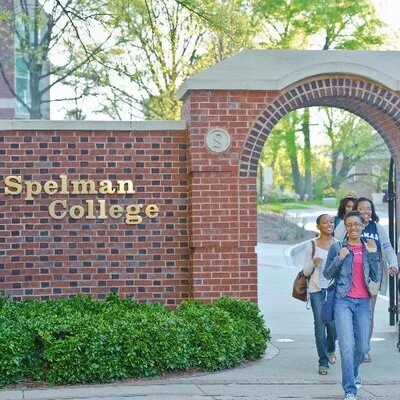Spotlight On: HBCUs You Should Know
Kamala Harris graduated from Washington, D.C.’s Howard University.
By NILUFAR HALIMOVA and NYROBI PETERS
America’s Historically Black Colleges and Universities (HBCUs) offer a unique educational experience. With majority-black student populations and campus life that features a deep dive into black culture, HBCUs are a great option for many juniors and seniors who are still looking for the college of their dreams.
Morehouse is Atlanta’s highly regarded all-male HBCU.
Morehouse College, one of the nation’s leading HBCUs, is an all-men’s private college located in Atlanta, Georgia. The school offers Bachelor’s Degree programs in business, education, the humanities, and the physical and natural sciences.
“Morehouse provides male students with a rich history, pride, integrity, and self-awareness,” said a Morehouse sophomore on Niche.com. “It creates an expectation that you and your brother have a responsibility to each other. Every student is expected to gain a knowledgeable education, graduate, and gain meaningful employment.”
Students at Morehouse can study abroad in Africa, Central America, and Europe. This HBCU has an acceptance rate of 51% and a tuition rate of roughly $26,000, with 2,238 undergraduates. Much like other schools, Morehouse has gone test-optional for its incoming freshman class.
Keep in mind that tuition does not include extra fees or room and board, which could raise the overall cost another $15,000 or so. Still, the cost of HBCUs is often lower than a lot of other quality private and out-of-state schools, which shows the value they offer.
“I graduated from Morehouse ten years ago, and I have to say that it was one of the most significant, transformative, inspirational experiences of my life as a black man,” said a Morehouse alumni on Niche.com. “Morehouse isn't perfect -- their dorms, food, and admin [need improvement] -- but even so they help form a special bond with your brothers. It's one of those things that you value in retrospect as time passes.”
Spelman is another exceptional all-black private liberals arts college located in Atlanta, though this one is for women. Spelman is ranked as the country’s #1 HBCU by U.S. News & World Report.
Spelman College, also in Atlanta, is ranked the #1 HBCU by U.S. News & World Report.
“Spelman College is truly meant for women who are ready to learn about their culture, dive into deep issues, and are prepared to grow in character,” said a Niche user. “Their academics are like no other (very rigorous). Spelman challenges the individual to think beyond the surface. Spelman also has a beautiful campus, which is well-secured from the surrounding community of Atlanta.”
Spelman’s acceptance rate of 40% is tough. Like Morehouse, it has a smaller-sized population, with 2,123 undergraduates, and a tuition rate of about $26,000.
“Spelman College is the school I thought I would never be able to make it into, because the girls here are extremely intelligent, leaders, and very active, and I felt like I could not offer anything to make it a greater place,” said a Spelman student on Niche. “But I love my school, not only because I can brag about being at the number one HBCU, but because everyone that surrounds you inspires you to go for your dreams and push yourself to the next level. The sisterhood here is unbelievable; we really are one big family.”
Next up, and nestled on 300 acres of land in Washington, D.C. is one of the nation’s best known HBCUs: Howard University. Howard specializes in medicine, engineering, architecture, religion, law, music, social work, and education. Howard has a graduation rate of 59% and tuition of $26,464, with 5,991 undergraduates. The school’s ultimate goal, according to their website, is to forward the development of scholars and professionals who drive change, and engage in scholarship that provides solutions to contemporary global problems, particularly ones impacting the African Diaspora.
“I chose Howard University due to the unique opportunity to be around other black students whose academic goals mirror my own,” said Howard freshman Ruth Davis, in the school’s magazine. “Howard’s ability to nurture and provide opportunities to black students in science, technology, engineering, and math is creating a pipeline that will help to increase the global presence of contributions from black scholars in those fields.”
Many black HBCU students mentioned the special appeal of an all-black (or mostly-black) campus where they would not feel overlooked or like they were being treated differently or as a token -- a place where they personally felt more comfortable.
Kamala Harris, our vice-president elect, attended Howard, graduating with degrees in political science and economics. The late Chadwick Boseman and Taraji P. Henson, both American actors, also graduated from Howard.
Another great HBCU, and the last one on this list, is Florida A&M, which is located in Tallahassee, Florida’s capital. FAMU is the largest school on this list, with 9,626 students (65% female and 35% male). It has a 15 to 1 student to teacher ratio and a 41% graduation rate (unfortunately, the lowest on our list).
Thanks to its size, FAMU has 54 bachelor’s degrees, 29 master’s degrees, three professional degrees, and 12 doctoral degrees to choose from. Some of its top programs are architecture, journalism, computer information sciences, psychology, pharmaceutical sciences, public health, physical therapy, engineering, physics, and more.
Florida A&M is the largest HBCU on this list.
If you decide to attend FAMU, your tuition cost will be around $26,500 out-of-state without financial aid, and about $15,000 with financial aid, on average. About 95% of FAMU’s undergraduate students receive student aid, with 1,303 receiving their aid from scholarships or grants and 933 students receiving their aid from federal grants. Again, the cost is similar for all the schools on this list.
Besides the usual academic, need-based, athletic, minority, female, creative, and unusual case scholarships offered nationally, many of these schools also offer their own scholarships and financial aid.
There are more HBCUs than those on this list, but these are some of the most distinguished. Hopefully, we’ve helped to kickstart your search. Good luck!




